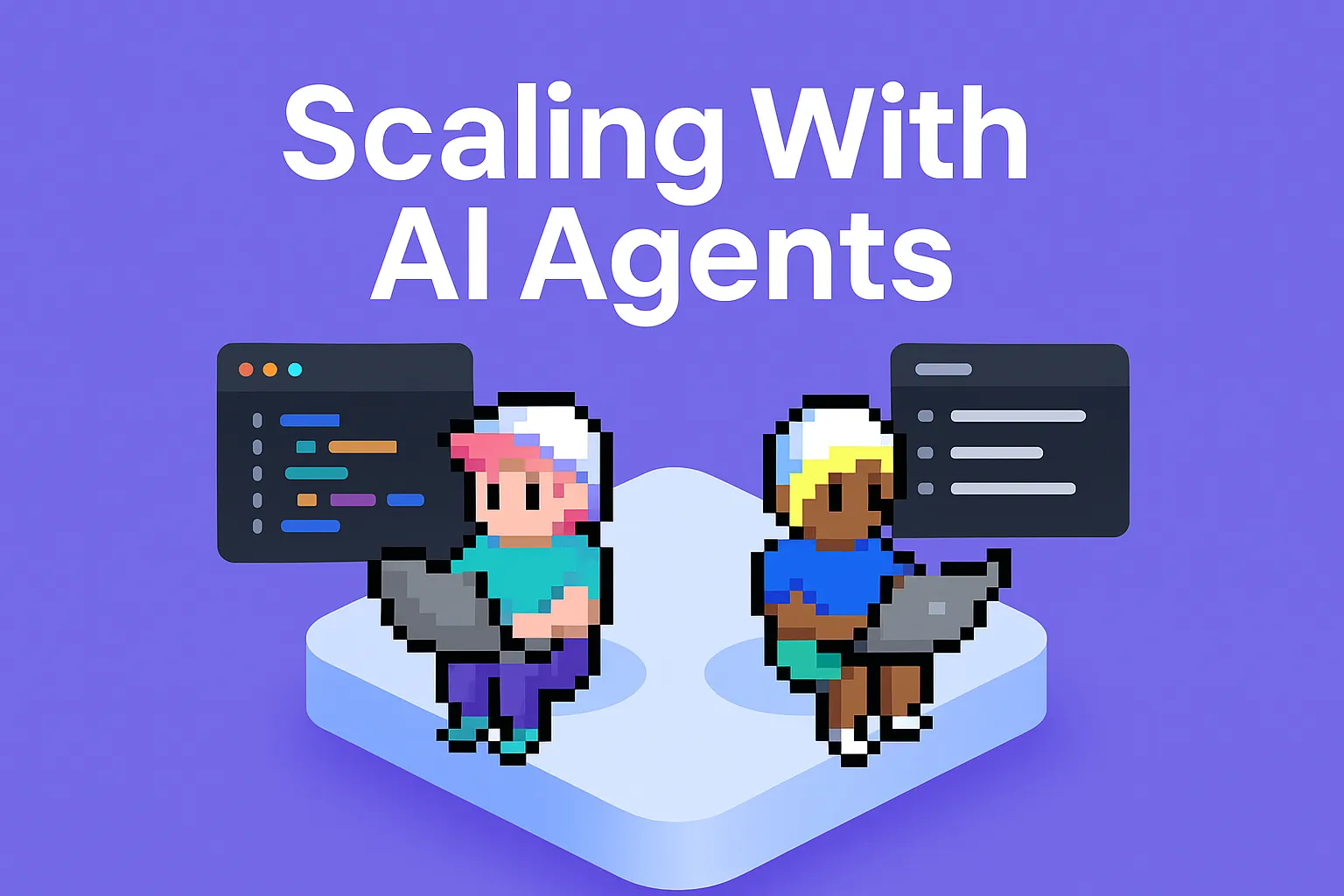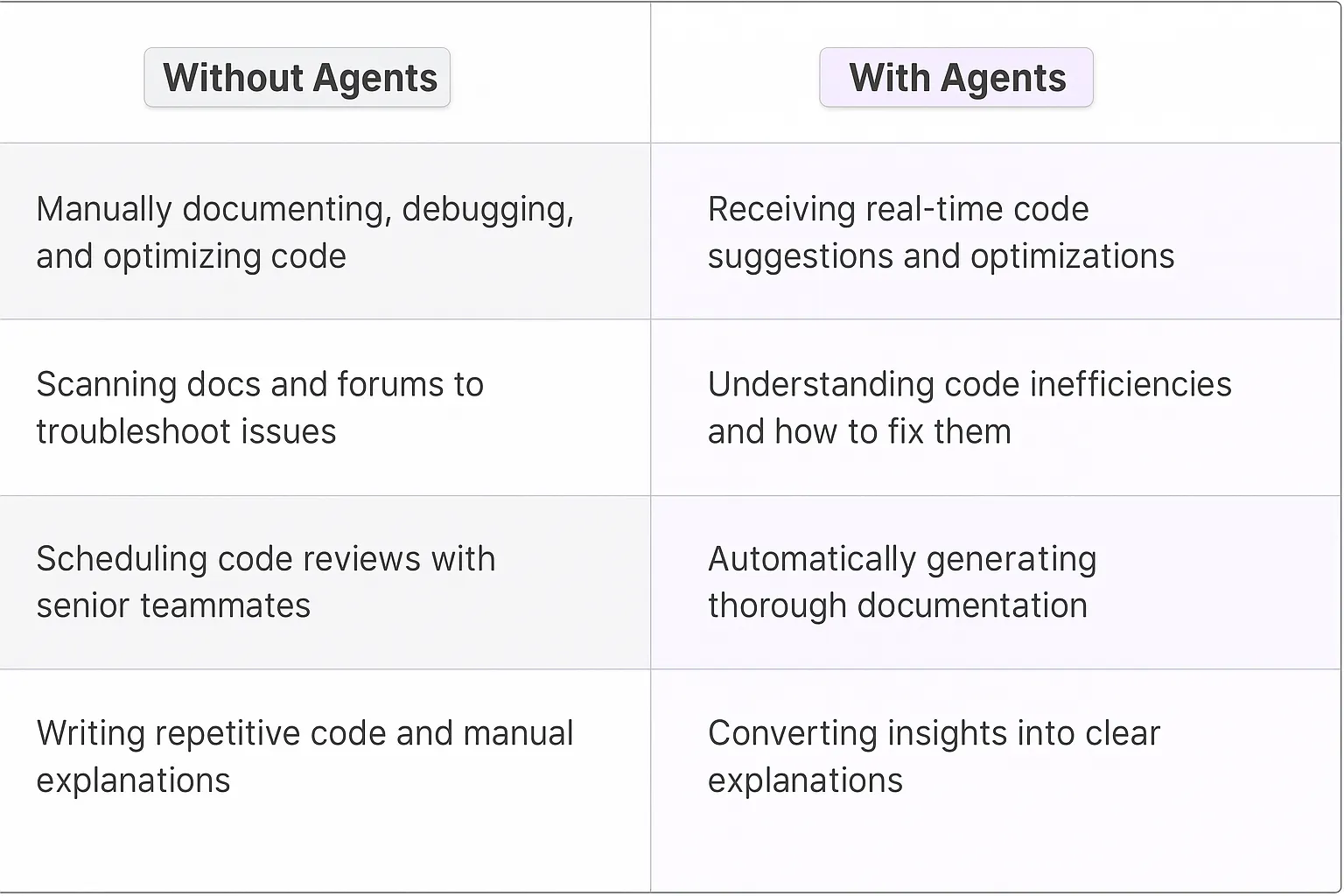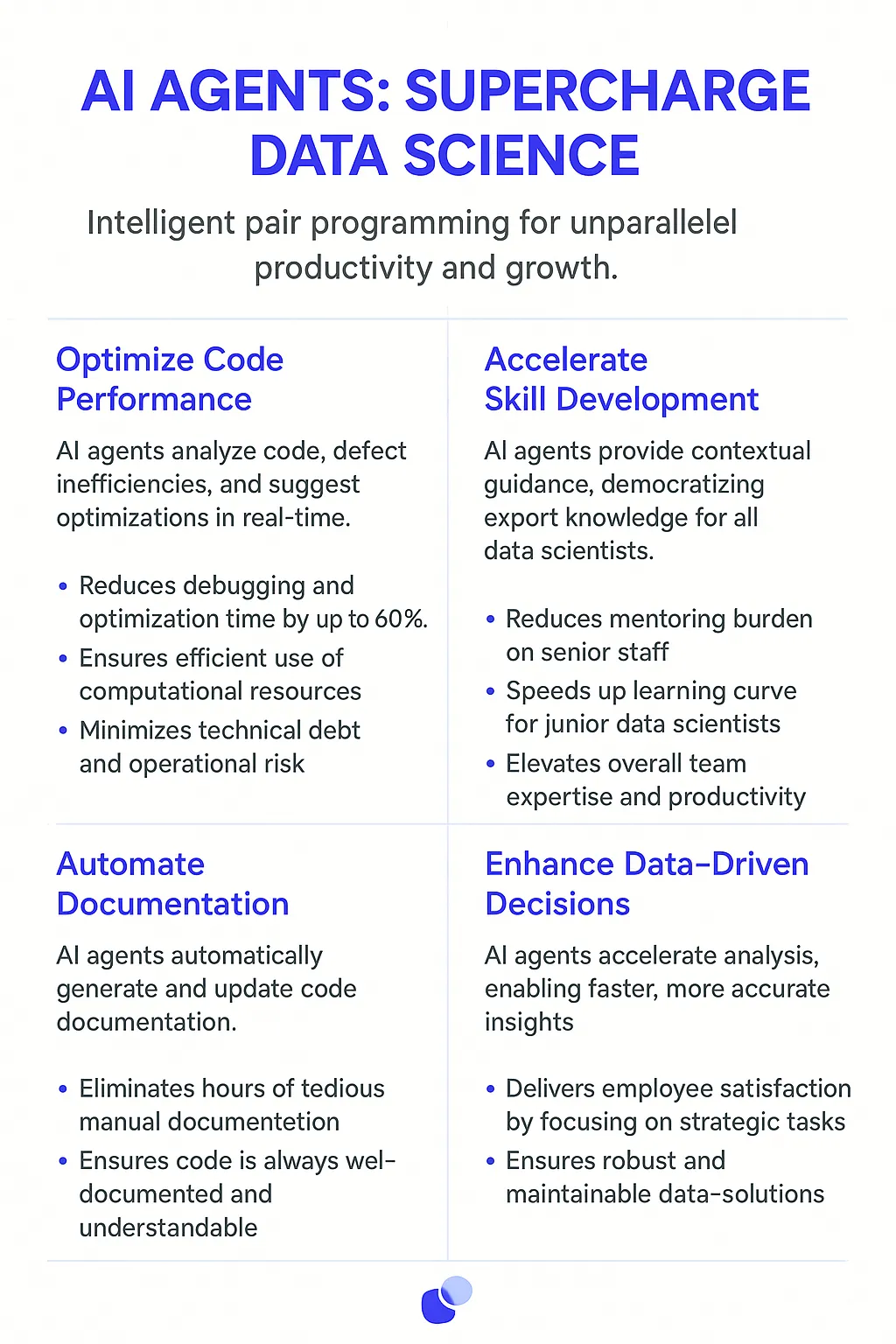Deepnote
Understanding Deepnote's Collaborative Platform
Deepnote is a collaborative data science platform that brings together the power of Jupyter notebooks with real-time collaboration features. Built for modern data teams, it provides a cloud-native environment where data scientists can write code, analyze data, and share insights seamlessly. The platform eliminates traditional setup hurdles and infrastructure management, letting teams focus on extracting value from their data.
Key Features of Deepnote
- Real-time collaboration capabilities that enable multiple team members to work simultaneously
- Integrated version control and reproducible environments
- Native support for popular data science libraries and frameworks
- Automated resource scaling for computational tasks
- Rich visualization tools and interactive dashboards
- Seamless integration with modern data stacks and cloud services

Benefits of AI Agents for Deepnote
What would have been used before AI Agents?
Data scientists and analysts working in Deepnote previously relied on manual code documentation, debugging, and optimization processes. They spent countless hours scanning through documentation, Stack Overflow posts, and GitHub issues to troubleshoot problems. Code reviews required scheduling time with senior team members, creating bottlenecks in development cycles. Data exploration and analysis involved writing repetitive boilerplate code and manually explaining findings to stakeholders.
What are the benefits of AI Agents?
AI Agents transform the Deepnote workflow by acting as expert pair programmers who never sleep. They provide real-time code suggestions and optimizations while explaining the reasoning behind each recommendation - similar to having a senior developer looking over your shoulder but without the awkward hovering.
The agents excel at:
- Detecting and explaining code inefficiencies with specific suggestions for improvement, reducing debugging time by up to 60%
- Automatically generating comprehensive documentation that follows best practices, saving hours of manual documentation work
- Converting complex data insights into clear, natural language explanations that non-technical stakeholders can understand
- Suggesting optimal data visualization approaches based on the specific characteristics of your datasets
- Providing contextual learning resources and examples when introducing new libraries or techniques
The network effects are particularly powerful - as more data scientists use AI Agents in Deepnote, the agents learn from successful patterns and approaches across projects. This creates a continuously improving knowledge base that benefits the entire user community.
For growing data teams, AI Agents serve as a force multiplier by reducing the mentoring burden on senior team members while still maintaining high standards for code quality and documentation. They enable junior data scientists to work more autonomously while learning best practices through interactive guidance.

Potential Use Cases of AI Agents with Deepnote
Processes
Data scientists and analysts working in Deepnote can leverage AI agents to accelerate their notebook development and analysis workflows. The agents excel at debugging Python code, suggesting optimizations for data processing pipelines, and providing real-time code recommendations based on the context of the analysis.
When working with complex datasets, AI agents can analyze data quality issues, identify potential biases, and recommend appropriate statistical methods. They serve as collaborative partners during exploratory data analysis by spotting patterns and correlations that might otherwise go unnoticed.
Tasks
AI agents in Deepnote shine at specific high-value tasks that data teams encounter daily:
- Converting raw SQL queries into optimized Pandas operations
- Generating clear documentation for custom functions and analysis workflows
- Explaining complex statistical concepts and methodologies in plain language
- Suggesting visualization approaches based on data characteristics
- Identifying potential memory optimization opportunities in data processing code
- Creating reproducible notebook templates for common analysis patterns
The real power emerges when data teams use AI agents for collaborative problem-solving. For example, when tackling a complex feature engineering challenge, the agent can propose multiple approaches, explain the tradeoffs, and help implement the chosen solution. This creates a feedback loop where both human expertise and AI capabilities combine to produce better outcomes.
For teams working on machine learning projects, AI agents can assist with model selection, hyperparameter tuning suggestions, and interpretation of results. They excel at explaining model behavior and helping teams document their experimental process for future reference.
The integration of AI agents into Deepnote workflows represents a shift toward more intelligent and efficient data science practices. Teams that embrace these digital teammates find themselves spending less time on repetitive tasks and more time on strategic analysis and insight generation.

Industry Use Cases
AI agents in Deepnote are transforming how data teams collaborate and execute complex analytical tasks. The integration creates powerful opportunities across multiple sectors, with each implementation revealing new potential for data-driven decision making. Looking at real-world applications, we're seeing data scientists and analysts leverage these digital teammates in ways that fundamentally alter their approach to problem-solving.
The most compelling aspect of Deepnote's AI capabilities lies in their ability to adapt to different analytical contexts while maintaining consistency in output quality. From financial modeling to scientific research, these AI agents serve as force multipliers for teams working with large datasets and complex computational challenges. What makes this particularly interesting is how different industries have developed unique applications that align with their specific analytical needs.
Through extensive observation of user behavior and implementation patterns, we've identified several standout use cases that demonstrate the practical impact of AI agents in Deepnote environments. These examples showcase not just the technical capabilities, but the tangible business outcomes that emerge when teams effectively deploy these tools.
Healthcare Analytics: Transforming Patient Care with Deepnote AI Agents
Healthcare organizations are drowning in patient data while facing critical staffing shortages. A major hospital network recently deployed Deepnote AI Agents to analyze millions of patient records and surface actionable insights that medical teams can use immediately.
The AI Agent acts as a specialized data scientist, running complex analyses across electronic health records, lab results, and clinical notes. When a physician needs to understand patient risk factors or treatment efficacy patterns, they can simply ask the Agent natural language questions.
For example, when investigating readmission risks, the Agent automatically:- Analyzes historical patient data to identify key predictive factors- Creates visualizations showing correlations between variables- Generates statistical models to quantify risk levels- Produces clear explanations of findings for medical staff
What previously took data teams weeks of manual analysis now happens in minutes. The Agent handles the technical heavy lifting while medical professionals focus on patient care decisions. One hospital reported reducing their analytics backlog by 70% within three months of deployment.
The real power comes from the Agent's ability to learn domain-specific medical knowledge and combine it with data science expertise. It understands medical terminology, standard protocols, and regulatory requirements - essentially becoming a specialized healthcare analyst that's available 24/7.
This represents a fundamental shift in how healthcare organizations leverage their data. Rather than periodic reports and dashboards, medical teams now have an always-on analytics partner that can answer complex questions on demand and surface insights proactively.
Financial Services: AI-Powered Risk Analysis and Market Intelligence
Investment firms face massive complexity analyzing global market data, economic indicators, and company financials. A leading asset management company recently integrated Deepnote AI Agents to augment their research and risk analysis capabilities with remarkable results.
The AI Agent functions as a specialized quantitative analyst, processing vast amounts of structured and unstructured financial data. Portfolio managers interact with it through natural conversations, getting instant insights that previously required days of analyst time.
When evaluating investment opportunities, the Agent systematically:- Synthesizes data from multiple financial databases and news sources- Identifies correlations between market events and asset performance- Builds predictive models for risk assessment- Generates detailed analysis reports with supporting visualizations
The impact on productivity has been substantial. Analysis cycles that traditionally took 2-3 weeks now complete in hours. One investment team reported making 40% more informed decisions in their first quarter using the Agent.
What makes this particularly powerful is the Agent's deep understanding of financial markets combined with its quantitative capabilities. It grasps complex financial instruments, regulatory frameworks, and market dynamics while applying sophisticated statistical methods - effectively serving as a tireless research analyst.
The technology fundamentally changes how investment firms process market intelligence. Instead of relying on periodic research reports, teams now have continuous access to AI-powered analysis that adapts to changing market conditions and new data inputs.
Most significantly, the Agent learns from each interaction, continuously improving its understanding of firm-specific investment strategies and risk parameters. This creates a compounding knowledge advantage that becomes more valuable over time.
Considerations for Deepnote AI Implementation
Integrating AI agents into Deepnote environments requires careful planning and strategic decision-making. Organizations need to evaluate their data infrastructure, security protocols, and team workflows before deployment.
Technical Considerations
Memory management becomes critical when running AI models alongside data processing tasks. Teams should monitor resource allocation and establish clear guidelines for concurrent notebook operations. API rate limits and computational bottlenecks can impact performance, especially during peak usage periods.
Version control presents unique challenges with AI-augmented notebooks. Code changes made by digital teammates need proper documentation and tracking mechanisms. Teams must implement robust testing frameworks to validate AI-generated code before production deployment.
Operational Challenges
Team adoption patterns vary significantly based on technical expertise levels. Data scientists may need additional training to effectively collaborate with AI agents while maintaining code quality standards. Clear communication protocols help prevent confusion between human and AI-generated contributions.
Cost management requires careful attention, particularly for organizations running multiple AI-enabled notebooks. Usage patterns should be monitored to optimize resource allocation and prevent unnecessary computational expenses.
Security and Compliance
Data privacy becomes more complex with AI agents processing sensitive information. Teams must implement proper access controls and audit mechanisms to track data handling. Compliance requirements may limit certain AI functionalities, especially in regulated industries.
Regular security assessments help identify potential vulnerabilities in AI-human interactions. Organizations should establish clear policies for handling intellectual property generated through collaborative AI workflows.
Performance Optimization
Response latency affects team productivity and requires ongoing optimization. Caching strategies and efficient prompt engineering help reduce computational overhead. Teams should establish performance benchmarks and monitoring systems to maintain optimal operation.
Integration with existing development tools needs careful consideration to prevent workflow disruptions. Clear documentation and standardized processes help teams maximize the benefits of AI augmentation while minimizing technical debt.
AI-Augmented Data Science: A Strategic Evolution
The integration of AI Agents into Deepnote marks a pivotal shift in data science workflows. These digital teammates don't just automate tasks - they fundamentally enhance how data teams collaborate, learn, and solve complex problems. The compound effects of AI-augmented workflows create lasting advantages for organizations that effectively deploy these capabilities. As the technology continues to evolve, teams that embrace this collaborative approach will find themselves better positioned to tackle increasingly sophisticated analytical challenges.
The real value emerges from the network effects of collective learning, where each interaction improves the system's ability to support future analysis. This creates a virtuous cycle of improvement that benefits the entire data science community. For organizations serious about scaling their data science capabilities, the combination of Deepnote and AI Agents represents a strategic advantage that will only grow stronger over time.













